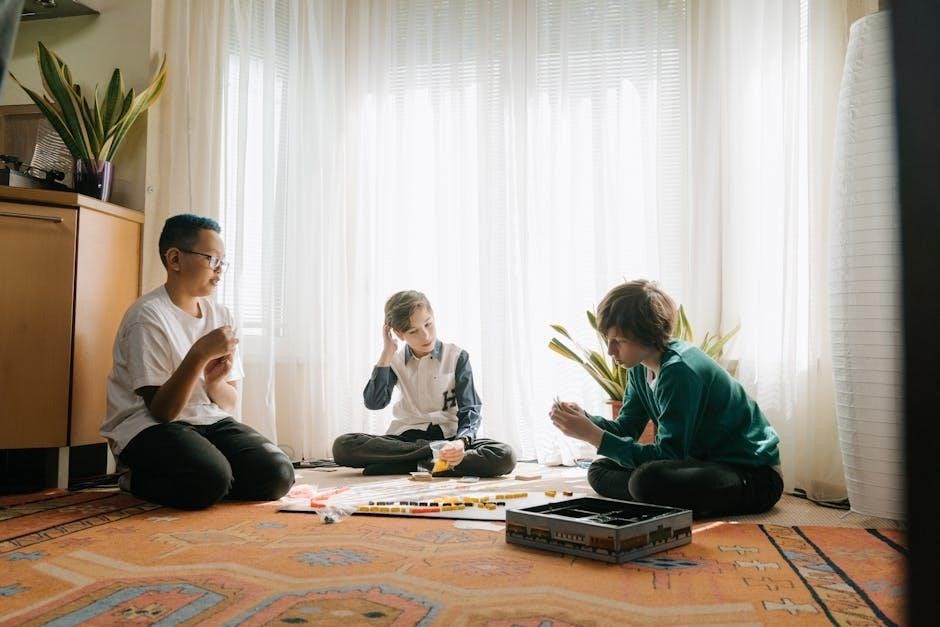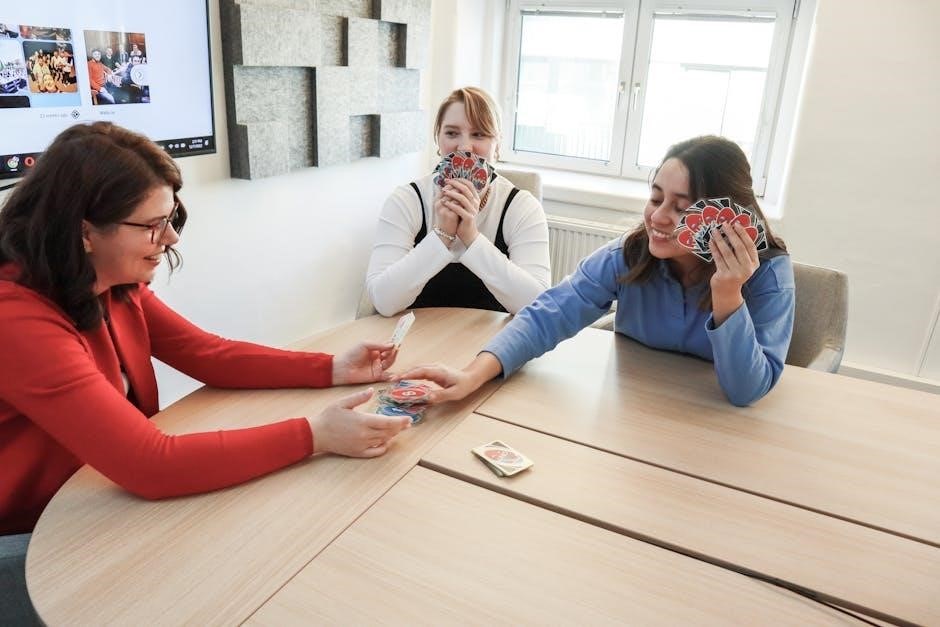Social scenario problem-solving task cards provide interactive learning experiences, helping students navigate real-life situations and develop critical thinking, empathy, and communication skills for better social interactions.
1.1 What Are Social Scenario Problem Solving Task Cards?
Social scenario problem-solving task cards are interactive resources designed to help students practice navigating real-life social situations through guided discussions and problem-solving activities. These cards present various scenarios, such as peer interactions, family situations, or classroom challenges, and ask students to brainstorm solutions or responses. They are often organized into sets, covering different categories like playground interactions or community-based situations. Task cards can be printed or used digitally, making them versatile for individual or group activities. They are designed to enhance social awareness, empathy, and critical thinking, providing students with practical tools to handle everyday social challenges effectively and confidently.
1.2 Importance of Teaching Social Problem Solving Skills
Teaching social problem-solving skills is essential for helping students navigate real-life challenges and build positive relationships. These skills enable students to think critically, understand others’ perspectives, and develop effective solutions to conflicts. By fostering empathy and self-awareness, social problem-solving skills promote emotional intelligence and resilience. They also empower students to communicate effectively and resolve disagreements respectfully. Equipping students with these skills prepares them to handle everyday social situations confidently and adapt to an ever-changing world. Strong problem-solving abilities not only enhance academic performance but also contribute to lifelong personal and professional success, making them a cornerstone of social-emotional learning.
1.3 Benefits of Using Task Cards for Social Skills Development
Task cards offer a versatile and engaging way to develop social skills, providing students with realistic scenarios to practice problem-solving. They encourage active participation, critical thinking, and collaboration, making learning interactive and fun. Task cards cater to diverse learning needs, allowing teachers to differentiate instruction. Their portability and ease of use make them ideal for various settings, such as classrooms, small groups, or individual practice. By focusing on real-life situations, task cards help students build empathy, communication, and conflict-resolution skills. They also provide opportunities for immediate feedback, reinforcing positive behaviors and fostering confidence in navigating social challenges. This practical approach ensures lasting skill development.

Benefits of Social Scenario Problem Solving Task Cards
Social scenario task cards enhance empathy, critical thinking, and communication skills, preparing students to navigate real-life interactions confidently while fostering collaboration and problem-solving abilities in diverse situations.
2.1 Enhancing Social Awareness and Empathy
Social scenario task cards fosters students’ ability to understand others’ perspectives and emotions, enhancing their social awareness and empathy. By engaging with realistic situations, students learn to recognize how their actions impact others and develop respectful communication skills. These activities encourage students to consider diverse viewpoints, promoting a deeper understanding of social dynamics. Task cards provide a platform for students to practice interpreting cues like body language and tone, helping them navigate interactions more effectively. This empathy-building process equips students to handle conflicts and collaborations with sensitivity, fostering a more inclusive and harmonious social environment. Regular practice strengthens their ability to connect with peers on a deeper level.
2.2 Developing Critical Thinking and Decision-Making Skills
Social scenario task cards encourage students to analyze complex social situations, fostering critical thinking and decision-making abilities. By presenting realistic dilemmas, these tools prompt students to evaluate potential solutions, weigh consequences, and choose appropriate actions. This process enhances their capacity to think logically and make informed decisions. Task cards often require students to consider multiple perspectives, strengthening their ability to approach problems methodically. Regular practice with these scenarios helps students develop a structured approach to problem-solving, enabling them to tackle challenges confidently. These skills are transferable to real-life situations, equipping students with the tools to navigate social and academic challenges effectively.
2.3 Improving Communication and Conflict Resolution
Social scenario task cards enhance communication skills by encouraging students to express their thoughts and feelings effectively. Through role-playing and group discussions, students learn to articulate their perspectives clearly and listen actively. These activities also foster conflict resolution by presenting situations that require negotiation and compromise. Students practice identifying issues, expressing emotions respectfully, and proposing solutions. Task cards often include scenarios involving disagreements or misunderstandings, guiding students to develop peaceful resolutions. Regular practice helps students build confidence in addressing conflicts constructively, leading to improved interpersonal relationships and a more harmonious social environment. These skills are essential for navigating real-life interactions successfully.
2.4 Preparing Students for Real-Life Situations
Social scenario task cards effectively prepare students for real-life situations by exposing them to diverse, relatable challenges. These cards present everyday dilemmas, such as resolving peer conflicts, handling family disputes, or addressing classroom issues. By discussing and problem-solving these scenarios, students develop practical strategies to manage similar situations independently. Task cards encourage critical thinking and adaptability, enabling students to approach real-life problems with confidence. They also promote emotional intelligence, helping students understand different perspectives and respond appropriately. This preparation equips students with the skills needed to navigate the complexities of social interactions and make informed decisions in various contexts, fostering resilience and self-assurance.

How to Use Social Scenario Problem Solving Task Cards
Use task cards to set up group discussions, encourage collaboration, or provide individual practice. They engage students in real-life scenarios, fostering problem-solving and critical thinking skills effectively.
3.1 Setting Up a Task Card Activity
Setting up a task card activity involves organizing the cards, designating roles, and ensuring students understand the process. Start by selecting relevant scenarios and distributing the cards evenly among participants. Create a structured environment where students can discuss each scenario thoughtfully. Encourage active listening and respectful communication to foster collaboration. For younger students, consider pairing them with peers or adults to guide their problem-solving. Ensure clear instructions are provided, and model the expected behavior to help students navigate the activity confidently. This setup promotes engagement and ensures that all participants can contribute effectively to the discussion.
3.2 Encouraging Group Discussions and Collaboration
Encouraging group discussions and collaboration enhances problem-solving skills and fosters teamwork. Begin by introducing the task card scenario to the group, ensuring everyone understands the context. Encourage active listening by having students share their thoughts one at a time. Use structured methods like Think-Pair-Share to promote participation and reduce dominance by outspoken students. Assign roles, such as facilitator or recorder, to keep discussions organized. Encourage students to build on each other’s ideas and explore multiple perspectives. Provide open-ended questions to guide the conversation and help students think critically. This collaborative approach not only strengthens social skills but also prepares students for real-world teamwork scenarios.
3.3 Using Task Cards for Individual Practice
Using task cards for individual practice allows students to develop social problem-solving skills at their own pace. Begin by distributing task cards with specific scenarios, such as dealing with peer interactions or classroom situations. Encourage students to reflect on each scenario independently, identifying potential solutions and consequences. Provide structured worksheets or reflection forms to guide their thinking, ensuring they consider multiple perspectives and outcomes. Allow time for students to write down their thoughts and solutions, then review their responses to offer feedback. This method helps reinforce individual understanding and provides a quiet space for introverted or shy students to engage deeply with the material without feeling overwhelmed.
Categories of Social Scenarios Covered in Task Cards
Task cards cover diverse social scenarios, including peer interactions, family dynamics, classroom behaviors, playground etiquette, and community-based situations, preparing students for real-life challenges across various settings.
4.1 Interactions with Peers
Task cards focusing on peer interactions address scenarios like cooperation, conflict resolution, and understanding social cues. Students learn to navigate situations such as sharing, taking turns, and handling disagreements. These cards encourage empathy by exploring others’ perspectives and fostering respectful communication. They also help students develop strategies for initiating or maintaining friendships, dealing with bullying, or resolving misunderstandings. By practicing these skills, students gain confidence in interacting with peers, promoting positive relationships and a supportive social environment. These scenarios are designed to mirror real-life challenges, equipping students with the tools to manage everyday interactions effectively and develop lifelong social skills.
4.2 Family and Home Situations
Task cards addressing family and home situations help students navigate common household challenges, such as resolving sibling conflicts, managing chores, or expressing emotions effectively. These scenarios encourage students to think critically about communication strategies within a family context. For example, cards might present situations like forgetting to complete a task or disagreeing with a sibling, prompting students to brainstorm respectful solutions. By practicing these scenarios, students learn to balance personal needs with family responsibilities, fostering healthier home dynamics. These cards also prepare students to handle real-life family interactions with empathy and problem-solving skills, strengthening their ability to contribute positively to their household environments.
4.3 Classroom and School Scenarios
Classroom and school scenarios on task cards address common challenges students face in educational settings, such as asking a teacher for help, resolving group work conflicts, or handling classroom rules. These cards present realistic situations like forgetting homework, dealing with peer disagreements, or understanding social cues from teachers. Students are encouraged to brainstorm solutions, such as politely asking to borrow materials or calmly addressing misunderstandings. By practicing these scenarios, students develop problem-solving strategies tailored to school environments, fostering confidence and cooperation. These tasks also help students navigate social dynamics, ensuring they can interact respectfully and effectively with peers and educators, preparing them for real-life academic and social interactions.
4.4 Playground and Recess Interactions
Playground and recess scenarios on task cards focus on common challenges during playtime, such as resolving disagreements, taking turns, or handling feelings of exclusion. These cards present situations like someone cutting in line, a friend refusing to share, or feeling left out during a game. Students are encouraged to think critically about how to address these issues respectfully, such as using “I” statements or suggesting compromises. By practicing these scenarios, students learn to navigate social dynamics in informal settings, fostering cooperation, empathy, and conflict resolution skills. These tasks help students develop strategies to handle playground interactions confidently, ensuring positive and inclusive play experiences for everyone involved.
4.5 Community-Based Social Situations
Community-based social situations on task cards address interactions in public settings, such as stores, parks, or public transportation. Scenarios might involve asking for directions, handling accidental bumps, or initiating conversations with strangers. These cards help students understand how to behave respectfully and safety-conscious in community environments. They encourage students to think about appropriate responses, such as apologizing if they bump someone or politely asking for help. By practicing these scenarios, students develop the skills to interact confidently and responsibly in the community, fostering social awareness and practical life skills that extend beyond the classroom into real-world interactions and everyday encounters with others.

Strategies for Teaching Social Problem Solving
Modeling the problem-solving process and teaching students to identify and express emotions are key strategies for effective social problem-solving instruction.
5.1 Modeling the Problem Solving Process
Modeling the problem-solving process involves teachers demonstrating how to approach and resolve social scenarios step-by-step. By thinking aloud, educators show students how to identify problems, brainstorm solutions, and evaluate consequences. This method helps students understand how to break down complex situations into manageable parts. Modeling also encourages empathy by highlighting how others might feel in a given scenario. Teachers can use task cards to create real-life examples, making the process relatable and interactive. Over time, students learn to apply these strategies independently, developing confidence in their ability to navigate social challenges effectively. This approach fosters a supportive environment for skill development and application.
5.2 Teaching Students to Identify and Express Emotions
Teaching students to identify and express emotions is crucial for effective social problem solving. Using task cards, educators can present scenarios that evoke various emotions, guiding students to recognize and articulate feelings. This process enhances emotional awareness and empathy. For instance, during reading time, discussions can focus on how characters feel, encouraging students to connect with these emotions. Teachers can also model emotional expression using “I” statements, such as “I feel sad when…” to promote honest communication. By practicing these skills, students develop the ability to understand and communicate their emotions, laying a strong foundation for resolving social conflicts and building positive relationships.
5.3 Guided Practice vs. Independent Problem Solving
Guided practice and independent problem solving are essential for developing social skills. Guided practice involves educators using task cards to walk students through problem-solving steps, ensuring understanding and confidence; This approach allows for immediate feedback and clarification. Independent problem solving, however, encourages students to apply learned strategies autonomously. Task cards provide realistic scenarios, enabling students to practice resolving conflicts and making decisions on their own. Gradually transitioning from guided to independent practice helps students build self-reliance and critical thinking. This balanced approach ensures students master social problem-solving skills, preparing them for real-world challenges and fostering lifelong independence in navigating complex social situations effectively.
5.4 Encouraging Respectful Disagreement and Compromise
Encouraging respectful disagreement and compromise is vital for fostering healthy social interactions. Using task cards, educators can present scenarios that require students to navigate differing opinions and collaborate on solutions. By modeling active listening and open communication, students learn to express their views respectfully while considering others’ perspectives. Teaching students to use “I” statements and focus on shared goals helps minimize conflicts and promotes mutual understanding. Encouraging compromise through structured discussions ensures students develop empathy and problem-solving skills, empowering them to resolve disagreements positively and maintain harmonious relationships in diverse social settings.

Ideas for Implementing Task Cards in the Classroom
Incorporate task cards into daily routines, use them for small group activities, or create engaging games like “Social Detective” to enhance problem-solving and social skills practice.
6.1 Incorporating Task Cards into Daily Routines
Incorporating task cards into daily routines can be seamless and effective. Start by using one scenario daily as a quick discussion starter or warm-up activity. This fosters consistent practice and reinforces problem-solving skills. For example, during morning meetings, present a task card to spark conversation and encourage students to share their thoughts and strategies. Additionally, integrate task cards into transition times, such as before lunch or recess, to maintain engagement. Laminated cards can be reused, making them a practical tool for frequent practice. This approach helps students develop a habit of applying problem-solving strategies to real-life situations naturally and confidently.
6.2 Using Task Cards for Small Group Therapy
Task cards are an excellent tool for small group therapy, fostering collaborative learning and social skill development. Organize students into mixed-ability groups to encourage peer support and diverse perspectives. Present a scenario from the task card and guide the group in brainstorming solutions, promoting active listening and respectful dialogue. Role-playing activities can be incorporated to practice identified solutions, helping students apply problem-solving strategies in real-time. This structured yet interactive approach allows therapists to assess progress and provide targeted feedback, ensuring each student gains confidence in navigating social challenges. Regular use of task cards in small groups enhances teamwork and fosters a supportive environment for skill mastery.
6.3 Creating a “Social Detective” Game
Transform social problem-solving into an engaging game by introducing the “Social Detective” concept. Students become “detectives” tasked with solving real-life scenarios presented on task cards. Each card outlines a social dilemma, encouraging students to analyze the situation, identify potential solutions, and predict outcomes. To enhance interactivity, incorporate role-playing or group discussions where students act out their proposed solutions. This game fosters critical thinking, empathy, and teamwork while making learning enjoyable. By framing problem-solving as a detective challenge, students develop essential social skills in a structured yet fun environment, preparing them to navigate complex interactions with confidence and creativity.
Assessing Student Progress with Task Cards
Assessing student progress involves monitoring engagement, evaluating problem-solving strategies, and providing constructive feedback to encourage improvement and refine social skills development.
7.1 Monitoring Participation and Engagement
Monitoring participation and engagement is crucial for assessing progress. Teachers can observe students during task card activities, noting their involvement in discussions and willingness to share ideas. Active participation often correlates with improved social problem-solving skills. By creating a supportive environment, educators encourage students to contribute freely, fostering confidence. Additionally, tracking engagement helps identify students who may need extra support. Positive reinforcement, such as verbal praise, can motivate students to stay involved. Regular observation ensures that all learners have opportunities to practice and apply their skills effectively, making task cards a valuable tool for ongoing assessment.
7.2 Evaluating Problem Solving Strategies
Evaluating problem-solving strategies involves assessing how students approach and resolve social scenarios. Teachers can review their ability to identify problems, brainstorm solutions, and consider consequences. This step helps determine if students demonstrate logical thinking and decision-making skills. By analyzing their strategies, educators can identify strengths and areas needing improvement. For instance, students may excel at generating ideas but struggle with evaluating their effectiveness. Providing constructive feedback guides them toward more thoughtful and adaptive solutions. Regular evaluation ensures students develop practical skills for real-life applications, fostering growth in their ability to navigate complex social situations independently and effectively.
7.3 Providing Feedback and Encouraging Improvement
Providing constructive feedback is essential for helping students refine their problem-solving skills. Teachers should guide students in reflecting on their strategies, highlighting strengths and areas for growth. This encourages self-awareness and improvement. For example, if a student suggests a solution that lacks empathy, the teacher can gently point this out and ask for alternative approaches. Positive reinforcement for creative or thoughtful solutions motivates students to continue developing their skills. Encouraging a growth mindset helps students view challenges as opportunities to learn. By fostering a supportive environment, educators empower students to take risks, experiment with new strategies, and grow into confident problem solvers.
Tools and Resources for Social Problem Solving
Explore a variety of tools, including free and paid task cards, digital platforms, and printable worksheets, designed to enhance social problem-solving skills in engaging and accessible ways.
8.1 Free and Paid Task Card Resources
Both free and paid task card resources are widely available, offering diverse scenarios for social problem-solving. Free options include downloadable PDFs from educational websites, providing basic scenarios for classroom use. Paid resources, such as specialized decks or subscriptions, offer more comprehensive and differentiated content, often tailored to specific age groups or needs. Platforms like Teachers Pay Teachers and Boom Cards feature extensive libraries of task cards, combining realistic situations with interactive elements. These resources cater to various learning styles, ensuring educators can select tools that align with their teaching goals and student requirements, making social problem-solving accessible and engaging for all learners.
8.2 Digital Tools for Interactive Problem Solving
Digital tools like Boom Cards and interactive PDFs enhance problem-solving engagement through multimedia and real-time feedback. These platforms offer scenario-based activities, allowing students to explore solutions digitally. Many tools include audio and visual aids, making learning accessible for diverse learners. Teachers can track progress and provide immediate feedback, fostering improvement. Interactive problem-solving tools also enable collaborative learning, where students can work in groups virtually. These resources are ideal for blended learning environments, ensuring students can practice social skills anytime, anywhere. By leveraging technology, educators can make problem-solving dynamic and engaging, helping students develop essential life skills in a modern, interactive way.
8.3 Printable Worksheets and Activity Guides
Printable worksheets and activity guides offer structured, hands-on experiences for practicing social problem-solving skills. These resources often include scenario-based exercises, step-by-step problem-solving frameworks, and reflection prompts. Worksheets can be tailored to different age groups and skill levels, making them versatile for individual or group use. Activity guides provide teachers with lesson plans and creative ideas for incorporating problem-solving into daily routines. Many printable resources are designed to complement task cards, offering a comprehensive approach to skill development. They are ideal for classrooms without access to digital tools or for students who benefit from tactile learning experiences, ensuring inclusivity and engagement in social skills development.
Social scenario problem-solving task cards are invaluable tools for fostering essential life skills, empowering students to navigate real-world challenges with confidence and resilience, promoting lifelong learning and growth.
9.1 The Impact of Social Scenario Task Cards on Student Development
Social scenario task cards significantly enhance students’ ability to navigate real-world challenges, fostering empathy, critical thinking, and effective communication. By engaging with diverse situations, students develop problem-solving strategies that promote resilience and adaptability. These tools encourage active participation and collaboration, preparing learners for lifelong social interactions. The structured approach of task cards helps students understand consequences of their actions, leading to better decision-making. Over time, this practice builds confidence, enabling students to handle complex social dynamics independently. Consequently, task cards play a pivotal role in shaping well-rounded individuals capable of thriving in various social environments.
9.2 Encouraging Lifelong Social Problem Solving Skills
Social scenario task cards empower students to develop lasting problem-solving abilities, equipping them to navigate challenges beyond the classroom. By practicing realistic scenarios, students learn to approach problems methodically, considering consequences and refining solutions. These skills foster independence, resilience, and adaptability, essential for future personal and professional relationships. The structured process of identifying emotions, brainstorming solutions, and evaluating outcomes becomes second nature, enabling students to confidently address conflicts and misunderstandings. Over time, this consistent practice reinforces a growth mindset, encouraging students to view challenges as opportunities for growth rather than obstacles. This foundation ensures they can thrive in diverse social environments throughout their lives.
